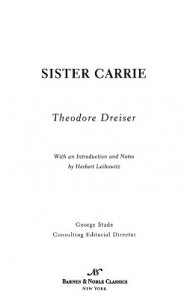Jennie Gerhardt - Драйзер Теодор (книги бесплатно без онлайн .txt) 📗
constantly recruited. Our modern brain-pan does not seem capable as yet
of receiving, sorting, and storing the vast army of facts and impressions which present themselves daily. The white light of publicity is too white.
We are weighed upon by too many things. It is as if the wisdom of the
infinite were struggling to beat itself into finite and cup-big minds.
Lester Kane was the natural product of these untoward conditions. His
was a naturally observing mind, Rabelaisian in its strength and
tendencies, but confused by the multiplicity of things, the vastness of the panorama of life, the glitter of its details, the unsubstantial nature of its forms, the uncertainty of their justification. Born a Catholic, he was no longer a believer in the divine inspiration of Catholicism; raised a
member of the social elect, he had ceased to accept the fetish that birth and station presuppose any innate superiority; brought up as the heir to a comfortable fortune and expected to marry in his own sphere, he was by
no means sure that he wanted marriage on any terms. Of course the
conjugal state was an institution. It was established. Yes, certainly. But what of it? The whole nation believed in it. True, but other nations
believed in polygamy. There were other questions that bothered him—
such questions as the belief in a single deity or ruler of the universe, and whether a republican, monarchial, or aristocratic form of government
were best. In short, the whole body of things material, social, and spiritual had come under the knife of his mental surgery and had been left but half dissected. Life was not proved to him. Not a single idea of his, unless it were the need of being honest, was finally settled. In all other things he wavered, questioned, procrastinated, leaving to time and to the powers
back of the universe the solution of the problem that vexed him. Yes,
Lester Kane was the natural product of a combination of elements—
religious, commercial, social— modified by that pervading atmosphere of
liberty in our national life which is productive of almost uncounted
freedom of thought and action. Thirty-six years of age, and apparently a
man of vigorous, aggressive, and sound personality, he was, nevertheless, an essentially animal-man, pleasantly veneered by education and
environment. Like the hundreds of thousands of Irishmen who in his
father's day had worked on the railroad tracks, dug in the mines, picked
and shovelled in the ditches, and carried up bricks and mortar on the
endless structures of a new land, he was strong, hairy, axiomatic, and
witty.
"Do you want me to come back here next year?" he had asked of Brother Ambrose, when, in his seventeenth year, that ecclesiastical member was
about to chastise him for some school-boy misdemeanour.
The other stared at him in astonishment. "Your father will have to look after that," he replied.
"Well, my father won't look after it," Lester returned. "If you touch me with that whip I'll take things into my own hands. I'm not committing any punishable offences, and I'm not going to be knocked around any more."
Words, unfortunately, did not avail in this case, but a good vigorous Irish-American wrestle did, in which the whip was broken and the discipline of
the school so far impaired that he was compelled to take his clothes and
leave. After that he looked his father in the eye and told him that he was not going to school any more.
"I'm perfectly willing to jump in and work," he explained. "There's nothing in a classical education for me. Let me go into the office, and I guess I'll pick up enough to carry me through."
Old Archibald Kane, keen, single-minded, of unsullied commercial
honour, admired his son's determination, and did not attempt to coerce
him.
"Come down to the office," he said; "perhaps there is something you can do."
Entering upon a business life at the age of eighteen, Lester had worked
faithfully, rising in his father's estimation, until now he had come to be, in a way, his personal representative. Whenever there was a contract to be
entered upon, an important move to be decided, or a representative of the manufactory to be sent anywhere to consumate a deal, Lester was the
agent selected. His father trusted him implicitly, and so diplomatic and
earnest was he in the fulfilment of his duties that this trust had never been impaired.
"Business is business," was a favourite axiom with him, and the very tone in which he pronounced the words was a reflex of his character and
personality.
There were molten forces in him, flames which burst forth now and then
in spite of the fact that he was sure that he had them under control. One of these impulses was a taste for liquor, of which he was perfectly sure he
had the upper hand. He drank but very little, he thought, and only, in a
social way, among friends; never to excess. Another weakness lay in his
sensual nature; but here again he believed he was the master. If he chose to have irregular relations with women, he was capable of deciding where
the danger point lay. If men were only guided by a sense of the brevity
inherent in all such relationships there would not be so many troublesome consequences growing out of them. Finally, he flattered himself that he
had a grasp upon a right method of living, a method which was nothing
more than a quiet acceptance of social conditions as they were, tempered
by a little personal judgment as to the right and wrong of individual
conduct. Not to fuss and fume, not to cry out about anything, not to be
mawkishly sentimental; to be vigorous and sustain your personality intact
— such was his theory of life, and he was satisfied that it was a good one.
As to Jennie, his original object in approaching her had been purely
selfish. But now that he had asserted his masculine prerogatives, and she had yielded, at least in part, he began to realise that she was no common girl, no toy of the passing hour. There is a time in some men's lives when they unconsciously begin to view feminine youth and beauty not so much
in relation to the ideal happiness, but rather with regard to the social
conventions by which they are environed.
"Must it be?" they ask themselves, in speculating concerning the possibility of taking a maiden to wife, "that I shall be compelled to swallow the whole social code, make a covenant with society, sign a
pledge of abstinence, and give to another a life interest in all my affairs, when I know too well that I am but taking to my arms a variable creature
like myself, whose wishes are apt to become insistent and burdensome in
proportion to the decrease of her beauty and interest?" These are the men, who, unwilling to risk the manifold contingencies of an authorised
connection, are led to consider the advantages of a less-binding union, a temporary companionship. They seek to seize the happiness of life
without paying the cost of their indulgence. Later on, they think, the more definite and conventional relationship may be established without
reproach or the necessity of radical readjustment.
Lester Kane was past the youthful love period, and he knew it. The
innocence and unsophistication of younger ideals had gone. He wanted
the comfort of feminine companionship, but he was more and more
disinclined to give up his personal liberty in order to obtain it. He would not wear the social shackles if it were possible to satisfy the needs of his heart and nature and still remain free and unfettered. Of course he must




